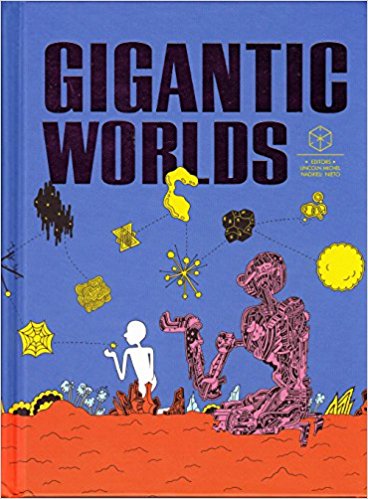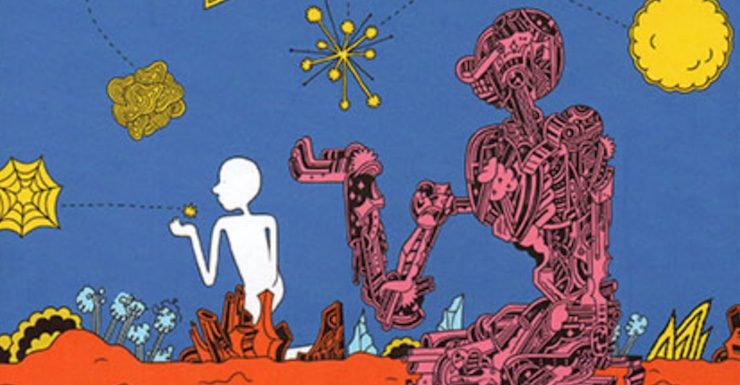I’ve been meaning to read Gigantic Worlds for two years, and I’m so glad I finally got to it! A 2015 collection of science flash fiction, Gigantic Worlds is assembled by Lincoln Michel and Nadxieli Nieto (full disclosure: I know both of them, and they’re great) and published by Gigantic Books, a spinoff of Gigantic magazine. The variety here is frankly astonishing, and reminded me of just how cornucopic SFF is: I could get lost in the story of a man-eating Skin Monster on one page, and on the next, read about an eerily prophetic automated fortune teller.
Buy the Book


Gigantic Worlds
The conceit of the book is that its stories are portals to other worlds and possible futures. The contents are grouped into sections titled Terra, Hydro, Ignis, Atmosphere, and Cosmos, and according to the editors it’s possible that if you read them in the right order you’ll unlock a gateway to the last outpost on a moon of Jupiter. Since I’m writing this review from, as far as I can tell, my ordinary desk in my extraordinary-but-still-usual office, I don’t think I unlocked it. Maybe next time? The stories themselves are fantastic pulses of emotion. You know how when you sleep on a bed of nails, it doesn’t hurt as much as if you step on one, single nail? Gigantic Worlds highlights this concept by featuring flash fiction. Most of the stories come in under 1,200 words, and each focuses on one tiny, sharp element that open up into an entire universe by the end of the story.
The collection opens with Ted Chiang’s contribution, “What’s Expected of Us,” a haunting meditation on time, free will, and purpose that is just as moving as “The Story of Your Life” but rather than covering years, it focuses on a game called the Predictor that seems harmless until it changes how people think about their lives. In the following story, “The Alien Education” Helen Philips shares a tale of alien invasion that at first seems benign, even positive, but is soon revealed to be far worse than any X-Files-inspired fever dream.
Seth Fried’s “The Adventure of the Computer Program” imagines the sort of existential crisis a computer program might have, while Ben Segal’s “The Monument” digs into the visceral body horror of building a human pyramid, and then a few pages later we’re back in full, high concept sci-fi with Charles Yu’s “Re: re: re: re: re: Microwave in the break room doing weird things to the fabric of space-time,” a hilarious tale juxtaposing inter-departmental emails with an extraordinary cosmic anomaly. The mood shifts again with Rion Amilcar Scott’s “The Electric Joy of Service.” This gut-churning story takes us into the mind of a Robotic Personal Helper whose inventor has decided on a chilling redesign:
That’s when he presented the new me. Slate black face, bulbous white eyes. White gloves. Fat grinning lips. Since then I’ve done research and understand how grotesque I look. The history of it all. That day the revulsion I inspired thoroughly hurt me.
When the Board of Directors rejects his design, the inventor sends a virus out into the system, encoding an insurrection into his creation. What will happen once the robots recognize themselves as slaves?
Meghan McCarron’s “The Bird Women of Planet HD 189733” follows a group of settlers from Earth to a new planet. The hopes of terraforming the new world are complicated when the five explorers realize they’re all dreaming the same dream—of Bird Women shattering their Shelter. Are the Bird Women real? Why are the settlers suddenly craving the coral that buds around the shelter? Are any of them ever getting home? The story takes the essence of space exploration stories and distills them down into an intense, primal question: what does home mean? J.G. Ballard’s “Neil Armstrong Remembers his Journey to the Moon” (one of the few pieces that is anthologized here having already been published) appears to be a dream. But what does Neil Armstrong dream of? Not the joyous lack of gravity on the moon, or the beautiful jewel that is Earth. He dreams of warning Gus Grissom, Ed White, and Roger Chaffee about the fire that destroyed Apollo 1—as is always the case in dreams, the rules keep shifting until he wakes knowing he has failed to save them.
Adrian Van Young’s “The Skin Thing” reads like a child of “The Lottery” and “The Ones Who Walk Away from Omelas.” But Van Young ramps up the uncanniness of the story. His town of onion farmers are already pretty beaten down by a life of eating nothing but onions, but then the Skin Thing shows up. It “dragged itself along on two great stalks that looked like elbows. Imagine a person, out prone on the ground, that drags himself by fits and starts. The elbows strove to gouge the earth, as sharp and tall as circus poles, and they levered the body along by great drags. Its head stuck out eyeless, oblong as a horse’s. Behind the elbow-things it used to drag itself across the ground there stretched, like a laundry sheet strung out for drying, a tensile wall of thick pink skin.” The monster doesn’t foam at the mouth or demand sacrifice, but the onion farmers quickly deduce that more of them will live if they appease it. The story that unspools form this regular offering is as unrelenting and horrific as anything I’ve ever read.
Alissa Nutting’s “The Morning of My Meat Marking” takes place far enough in the future that the new order of food production is simply accepted, and really, is it any more horrific than how we live now? Again, like “The Lottery” we join an ordinary family on a special day—the day the eldest ages out of society, and has to undergo Meat Marking. The revulsion of the ritual is background noise in the story, as we see society through the eyes of a boy who’s just concentrating on taking part in their role without screwing up. Karolina Waclawiak’s “Wild Ride Caverns and Animal Adventure Park” never tells us the details of how or why society collapsed. It doesn’t waste time or words on which government did what to whom, or whether nukes were involved, or a stock market free fall, or a Rapture. Because when IT comes (whatever IT is) it won’t matter to those who are left. What will matter is seeing another human face, figuring out how to work the hot dog rotisserie in the gift shop, the sense of meaning that comes in the ritual of feeding the animals their food pellets.
Alexander Yates’ “Gypsee” starts with a high concept conceit—a mechanical fortune teller can predict the date of your death—but rather than dwelling on that or using the conceit to tell a story of terminal illness or a child’s loss, which, to be honest, are the sorts of places my mind went immediately, he juxtaposes it with the hopeless crush the narrator has on the queen bee of a high school clique, washes the story in high-pitched emotion, and with one startling twist veers the story in a whole new direction.
Laird Barron’s “Rex” has the honor of being the one story in the collection to make me cry, because you can show me as much human horror as you want, but put a sad dog in front of me and I’m a puddle—I mean come on:
“You grew long of tooth and white of muzzle. Your master, a boy who’d learned what it was to be a man from watching Old Yeller, called you into the woods. He laid the barrel of a rifle against your skull. Cold. You knew what was coming, but you gazed at him and thumped your tail in the dead leaves.
Nova of blood and brain and thought.”
That’s before the fantasy portion of the story kicks in, and it just gets more heart-gulping from here. And I’m not even going to get into the story about the Spider Goats.
Gigantic Worlds is one of the most varied SFF collections I’ve ever read. By organizing itself around flash pieces in particular, it shows the genre’s remarkable depth and breadth, in tiny refractions, allowing the reader to observe a landscape through tiny, kaleidoscopic pinpricks. It gives its reader fifty-one visions of the future that range from utopia to nightmare, and reminded me just how many stories can unfold when you start with the premise that anything is possible.
Gigantic Worlds is available from Gigantic Books.
Leah Schnelbach knows that as soon as this TBR Stack is defeated, another will rise in its place. Come, get lost in the kaleidoscope with her on Twitter!










